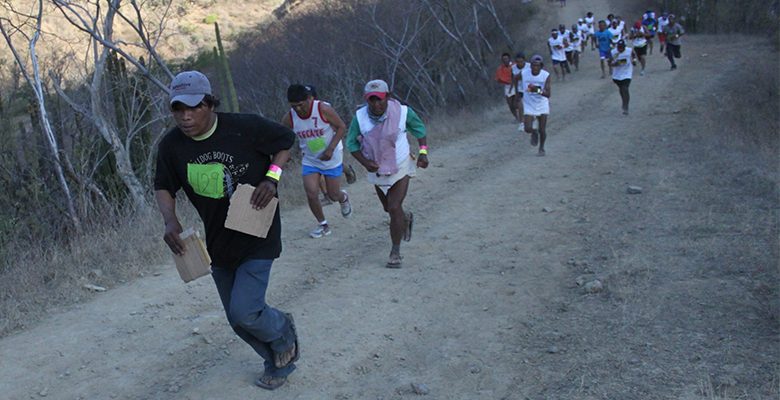This is a great story about an international humanitarian tragedy, out of Texas Monthly.
Mexican cartels, meanwhile, recognized an opportunity for a different sort of international commerce. Though the Tarahumara largely kept to themselves, poverty and hunger made them targets for narcos looking for mules willing to make the demanding trek to designated drug drop-off points in New Mexico, Arizona, and Texas. Cartel recruiters trolled the gas stations and plazas of small Mexican towns. They bought blue jeans for those wearing traditional loincloths and paired them with guides to lead them to the border at night. In the Tarahumara, the cartels found literal drug runners, who not only could cover incredible distances but were desperate enough to do it.
Silvino, with his farmland afflicted by unrelenting drought, was one of the desperate ones, so he signed on to tote drugs. Still, he got paid only if he successfully completed his mission. His first time, in 2005, he did just that, tossing his mochila into the back of a truck on a highway near El Paso. The second time, he completed his drop at a fancy hotel outside Las Cruces, New Mexico. The third time, though, in February 2007, Border Patrol agents found him and two others hiding in creosote bushes one hundred miles west of Las Cruces, with three backpacks that totaled 194 pounds. He was arrested and sentenced to eight months. And so when Micah True hosted the second Caballo Blanco, Silvino couldn’t make the race; he was sitting in a New Mexico prison.
After his release, it took Silvino two months to get home. Immigrations and Customs Enforcement agents left him in Juárez without enough money for a bus ticket home. He found a friend to front him enough to get to Janos, the first town on his route back. Once there, he picked chiles to earn the bus fare farther south to Chihuahua City, where he finally cobbled together the fare to Huisuchi by making cheese at a quesería.
Silvino swore he would never run drugs again, but by 2010, there was still not enough food to eat. His wife, Hilda, begged him not to go, but he felt he had no choice. He and his cousins would be paid 15,000 pesos ($825) apiece. In one week, he could make what usually took three months of labor in the Sierra—and there was little work. “A mí me vale,” Silvino told his wife. I think it’s worth it.
Now here he was, with six members of his own family—nearly a year after Born to Run had become an international best seller—striding through the dark up the boot heel of New Mexico. During the day, they slept beneath frayed creosote bushes, concealing their bags nearby, and at night they trudged north toward the freeway, avoiding rattlesnakes, coyotes, and most of all, la migra, the Border Patrol. They were close now, a few hours from their destination.
Then, all at once, they saw the spotlights. The Border Patrol had found them. Silvino flung his bags into the sand and began to run. Not again, he thought. He feared what might happen to his family if he went back to federal prison. An agent on a dirt bike tore after him as the others scattered. Silvino felt the adrenaline course through him, and he told himself to escape to the mountains they’d crossed on their way north. Amid the tall gray peaks and dry basins, he’d be harder to catch. Looking behind him, Silvino could see his nephew Luis flagging, but he couldn’t wait. He zigzagged around scrawny desert saplings, while the shadows cast by the dirt bike’s spotlight darted around him. He moved swiftly. He was conditioned to navigating switchbacks. Muy ligero, he told himself. Light-footed.
Go read the whole story at TexasMonthly.com.
Raramuri marathon photo by Eli Duke [CC BY-SA 2.0], via Wikimedia Commons


I want a Ferrari, but wouldn’t consider smuggling drugs to get one. The “tragedy” is that people can do all kinds of things claiming poverty and get sympathy. You wouldn’t feel sorry for a “rich” girl smuggling drugs to buy a purse but a “poor” person who chooses crime over work you write articles about and claim it as a tragedy. Lots of honest, hard working people are poor and never consider smuggling drugs, murder, etc. Poverty is subjective. I cannot afford to smoke because they raised the cost of cigarettes too high by adding egregious taxes. However, almost every homeless person I see apparently can afford to smoke. They probably cannot “afford” to smoke, they just have a different set of priorities for their spending, like beer and cigarettes vs my priorities mortgage and food.
I don’t think you can contemplate the poverty of a subsistence farmer who has lost his land. Like you said, poverty is subjective. Starving to death isn’t.
The title is gross and offensive to the Tarahumara people. Please delete this article or change the title, it only puts great disrespect to their name and their tribe.
What would you suggest?